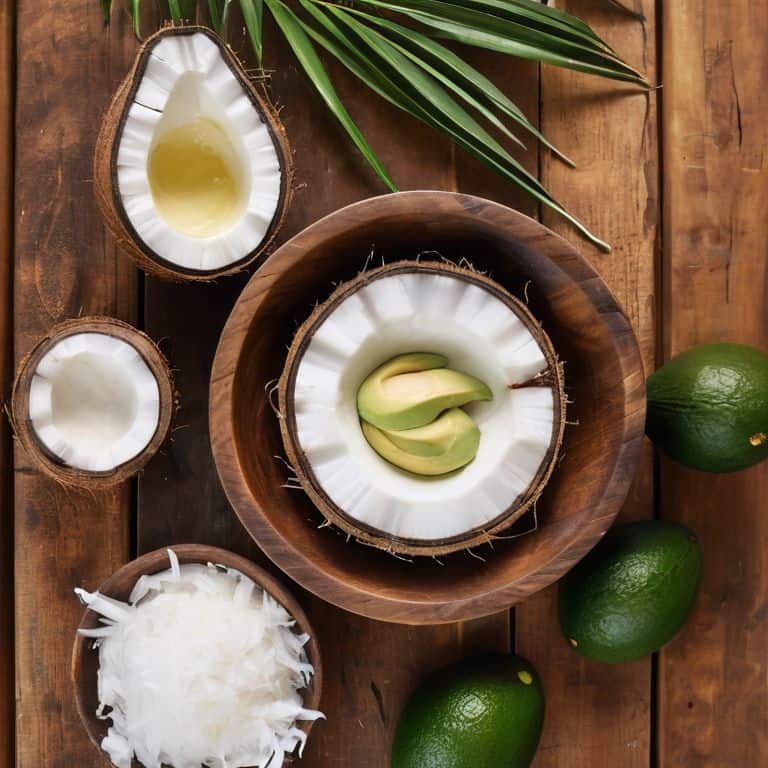I still remember the first time I encountered coconut oil in my nutrition practice – a client was convinced it was a miracle cure for everything from weight loss to skin issues, and wanted to know is coconut oil actually healthy. As a nutritionist, I was skeptical, but also curious – what was behind the hype? I dug into the research, and what I found surprised me: the science behind coconut oil’s health benefits was far more nuanced than the trendy headlines suggested.
In this article, I promise to cut through the clutter and give you the no-nonsense truth about coconut oil. I’ll share my expertise as a registered dietitian and nutritionist to help you understand the real benefits and drawbacks of this popular ingredient. We’ll explore the science behind its health effects, and I’ll provide you with practical tips on how to incorporate coconut oil into your diet in a way that’s both delicious and nutritious. My goal is to empower you with knowledge, not to sell you on a trendy solution – so let’s get started on this journey to uncover the truth about coconut oil.
Table of Contents
Unveiling Coconut Oil

As I delve into the world of coconut oil, I’m excited to uncover its nutritional benefits and explore how it can be a valuable addition to our diets. With its rich, creamy texture and distinct flavor, coconut oil has become a popular choice for cooking and baking. But what really sets it apart is its unique composition, which includes a high percentage of saturated fats. This has led to a lot of debate about its potential health effects, with some claiming it can help lower cholesterol levels and others warning of its potential drawbacks.
In traditional medicine, coconut oil has been used for centuries to promote overall health and wellbeing. From soothing skin irritations to nourishing hair, its uses are varied and widespread. But how does it compare to other popular oils, like olive oil? While olive oil is renowned for its heart-healthy properties, coconut oil has its own set of advantages, including a higher smoke point that makes it ideal for high-heat cooking. As a nutritionist, I’m fascinated by the coconut oil vs olive oil debate and eager to explore the science behind each.
As I continue to research the health effects of coconut oil consumption, I’m struck by the complexity of the issue. On one hand, coconut oil contains medium-chain triglycerides (MCTs) that have been shown to have potential benefits for weight management and energy production. On the other hand, its high saturated fat content has raised concerns about its impact on cholesterol levels. By examining the latest research and separating fact from fiction, I hope to provide a clearer understanding of coconut oil’s role in a balanced diet.
Coconut Oil Nutrition Benefits
As I delve into the world of coconut oil, I’m excited to explore its nutritional profile. With a rich composition of medium-chain triglycerides (MCTs), coconut oil is a unique blend of fatty acids that can have a positive impact on our overall health. From potentially improving cholesterol levels to aiding in weight management, the benefits of coconut oil are certainly intriguing.
Let’s take a closer look at the specific advantages of incorporating coconut oil into our diets. Healthy fats are a crucial component of a balanced diet, and coconut oil is an excellent source of these essential nutrients. By adding coconut oil to our meals, we can boost our energy levels, support immune function, and even promote healthy digestion.
Traditional Medicine Uses
In many cultures, coconut oil has been a staple in traditional medicine for centuries. It’s been used to soothe skin irritations, calm digestive issues, and even as a natural remedy for colds and flu. The oil’s unique combination of fatty acids and antioxidants makes it an effective treatment for various ailments.
Coconut oil’s anti-inflammatory properties have also been harnessed to treat wounds, reduce fever, and alleviate arthritis symptoms. Its antimicrobial effects have been used to combat infections and promote overall well-being. By embracing coconut oil as a natural remedy, we can tap into the wisdom of traditional medicine and discover new ways to nurture our bodies.
Is Coconut Oil Actually Healthy

As I delve into the world of coconut oil, I’m excited to explore its potential health effects of coconut oil consumption. While some swear by its benefits, others claim it’s a fad. To separate fact from fiction, let’s examine the coconut oil nutritional benefits. Coconut oil is rich in medium-chain triglycerides (MCTs), which have been shown to have unique metabolic effects. These MCTs may aid in weight management and even improve cholesterol levels.
One of the most significant advantages of coconut oil is its versatility. Not only can it be used in cooking, but it’s also a popular ingredient in traditional medicine. In some cultures, coconut oil is used to promote healthy skin and hair, and even as a natural remedy for various ailments. When compared to other oils, such as olive oil, coconut oil has a distinct profile. Coconut oil vs olive oil is a common debate, with each having its own set of benefits.
In my experience as a nutritionist, I’ve seen firsthand the impact of coconut oil on overall well-being. By incorporating it into a balanced diet, individuals can potentially experience improvements in their skin and hair health. However, it’s essential to remember that coconut oil is not a miracle cure. As with any food, moderation is key. By understanding the benefits and limitations of coconut oil, we can make informed decisions about its place in our diets.
Coconut Oil and Cholesterol Harmony
As I delve into the relationship between coconut oil and cholesterol, I’m excited to share that it’s not as straightforward as we’ve been led to believe. Balanced cholesterol levels are crucial for our overall health, and coconut oil plays a unique role in this harmony. While it’s true that coconut oil is high in saturated fats, which can raise LDL (bad) cholesterol, it also increases HDL (good) cholesterol, potentially offsetting the negative effects.
The key to understanding coconut oil’s impact on cholesterol lies in its medium-chain triglycerides (MCTs) content. These MCTs are metabolized differently than other fats, producing a more favorable lipid profile. By incorporating coconut oil into our diets in moderation, we may be able to support healthy cholesterol levels and even experience additional benefits, such as improved energy and weight management.
Coconut vs Olive Oil Showdown
When it comes to cooking oils, two popular options often come to mind: coconut oil and olive oil. In the coconut vs olive oil showdown, it’s essential to consider their unique characteristics. Coconut oil is known for its high smoke point, making it ideal for high-heat cooking, while olive oil is best suited for low-heat cooking or as a finishing touch.
In terms of nutritional benefits, olive oil shines with its high levels of monounsaturated fats, which can help lower cholesterol levels. However, coconut oil has its own set of advantages, including its potential to aid in weight management and provide a rich source of medium-chain triglycerides (MCTs).
Nourishing Your Way to Clarity: 5 Key Tips to Unlock Coconut Oil's Potential
- Start with high-quality coconut oil: Choose a cold-pressed, virgin coconut oil to reap the most nutritional benefits
- Balance your fats: Pair coconut oil with other healthy fats like olive oil and avocado to create a harmonious fatty acid profile
- Don’t overdo it: Use coconut oil in moderation, as part of a balanced diet, to avoid overloading on saturated fats
- Get creative with cooking: Experiment with coconut oil in various recipes, from savory stir-fries to sweet baked goods, to discover its versatility
- Monitor your body’s response: Pay attention to how your body reacts to coconut oil, and adjust your intake based on your individual needs and health goals
Key Takeaways: Navigating the Coconut Oil Conundrum
Coconut oil is a nutrient-rich food with unique health benefits, including high levels of medium-chain triglycerides (MCTs) that can support weight management and immune function
Despite its potential benefits, coconut oil is high in saturated fat, which may impact cholesterol levels and heart health – moderation and balance are key to incorporating it into a healthy diet
By embracing coconut oil as a versatile ingredient and using it in conjunction with other healthy fats, such as olive oil, you can create a balanced and joyful relationship with food that nourishes both body and soul
The Coconut Conundrum
Healthy eating shouldn’t be a war between our taste buds and our wellness goals – with coconut oil, it’s time to stop asking if it’s ‘good’ or ‘bad’ and start embracing its potential to bring joy and nourishment to our plates.
Laura Paskal
Embracing the Truth About Coconut Oil

As we’ve explored the world of coconut oil, it’s clear that its nutritional benefits are undeniable, from its unique fatty acid profile to its potential uses in traditional medicine. We’ve also delved into the comparison with olive oil, highlighting the distinct characteristics of each, and examined the relationship between coconut oil and cholesterol levels, discovering that it’s not as straightforward as once thought. Through this journey, I hope you’ve gained a deeper understanding of coconut oil’s place in a healthy diet, recognizing that it’s not a magic bullet, but rather one component of a balanced approach to nutrition.
So, as you move forward, I encourage you to view coconut oil as part of a larger tapestry of whole, nutrient-dense foods that bring you joy and satisfaction. Remember, the healthiest ingredient is indeed joy, and by embracing a variety of delicious, wholesome foods, you’ll be well on your way to a more balanced, thriving relationship with the food you eat and the body you nourish.
Frequently Asked Questions
Can I use coconut oil as a substitute for other oils in all recipes?
While coconut oil can be a fantastic substitute in many recipes, its distinct flavor and high smoke point mean it’s not always a 1:1 swap. I recommend using it in place of oils like butter or ghee in baked goods, sautés, and roasted vegetables, but maybe not in delicate dishes where its flavor might overpower. Experiment and find the perfect balance for your taste buds!
How does the high saturated fat content of coconut oil affect its overall health benefits?
The saturated fat in coconut oil can be a concern, but research shows it’s primarily made up of medium-chain triglycerides (MCTs), which are metabolized differently than other saturated fats. This unique composition may actually help raise HDL (good) cholesterol and support weight management, making coconut oil a more nuanced player in the world of healthy fats.
Are there any potential negative side effects of consuming coconut oil, especially for people with certain health conditions?
While coconut oil can be a great addition to a balanced diet, it’s essential to consider potential drawbacks. For those with high cholesterol or heart conditions, the saturated fat content may be a concern. Additionally, individuals with digestive issues like IBS may experience discomfort due to its high fiber content. Always consult with a healthcare professional or registered dietitian to determine the best approach for your unique needs.
